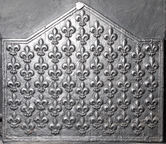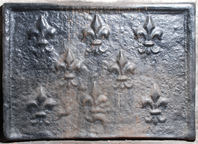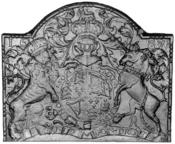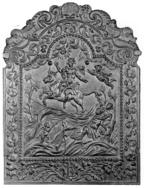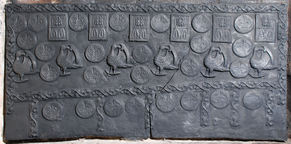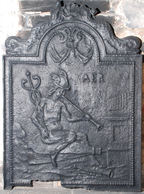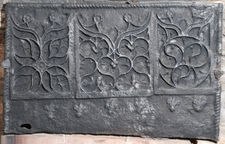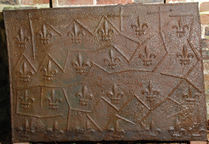-
88
Description: Rectangular with triangular arch; stepped fillet edging; eleven columns of fleurs de lys, maximum seven in column, but varied according to space, with fleurs alternated for spacing.
Notes: Whole pattern with five vertical planklines; a field of small fleurs de lys, France Ancient in royal heraldry, might suggest a continental origin.
Copies of this fireback are known.
- Decoration tags:
- rectangular with triangular arch (shape)
- stepped fillet (edging)
- whole carved pattern
- planklines
- heraldic
- objects
Manufactured: in the late-16th to early-17th century possibly in the Weald area of England.
Current location: Hampton Court, Richmond, Greater London, England.
- Attached to series:
- Miscellaneous royal firebacks
- Fleur-de-lys firebacks
-
89
Description: Quasi-arched rectangular shaped, with sides leaning slightly towards the top; wide ovolo edging (top and sides) with twisted rope relief; Tudor shield, garter, crown and supporters (crowned lion and dragon); motto along base; irregular ribbon behind.
Notes: Whole pattern; strong stylistic similarities with a Buckhurst arms fireback (no. 491), an example of which is at Michelham Priory, near Hailsham, East Sussex, suggest a common pattern maker and possibly furnace.
Inscription: DIEV ET MON DROI
Arms: Tudor royal (prob. Elizabeth I)
- Decoration tags:
- rectangular with round arch (shape)
- ovolo, simulated rope (edging)
- whole carved pattern
- armorial
- royal
- text
Manufactured: in the late-16th century in the Weald area of England.
Current location: Hampton Court, Richmond, Greater London, England.
Museum number: 1241 (part of the Royal Collection museum group)
- Attached to series:
- Ornate border series
- Tudor royal armorial firebacks
-
90
Description: Rectangular; ovolo moulded edging (top and sides); eight impressions of a fleur de lys, arranged in three horizontal rows (3-2-3), carefully spaced.
Notes: The same fleur de lys stamp has been noted on several firebacks, indicating a common source.
Copies of this fireback are known.
- Decoration tags:
- rectangular (shape)
- ovolo (edging)
- carved stamps
- heraldic
- objects
Manufactured: in the mid- to late-16th century possibly at Pounsley Furnace, Framfield in the Weald area of England.
Current location: Hampton Court, Richmond, Greater London, England.
(part of the Royal Collection museum group)
- Attached to series:
- Pounsley series
- Fleur-de-lys firebacks
-
92
Description: Arched rectangular shaped; paternost bead edging (top and sides); Stuart royal arms: shield, garter, helm, crown, crest, supporters and motto; date split between top corners; initials split beneath supporters.
Notes: Firebacks with royal arms attributable to the reign of James II are, inevitably, uncommon owing to the brevity of his reign. Paternost beads are more usually found as edging on ‘Dutch’ types of fireback. A polychrome casting of this fireback is displayed as the royal arms in St James's church in North Cray, Kent. Copies of this fireback were advertised in Bratt Colbran Ltd.'s (London) catalogue in the early-20th century.
Copies of this fireback are known.
Inscription: 1687 /HONI SOIT QUI MAL Y PENSE / I R / DIEU ET MON DROIT
Arms: English Stuart royal (James II)
- Decoration tags:
- rectangular with round arch (shape)
- bead-and-pellett (edging)
- whole carved pattern
- individual numbers
- armorial
- royal
- text
Manufactured: in 1687 possibly in the Weald area of England.
Current location: Hampton Court, Richmond, Greater London, England.
Museum number: 1010 (part of the Royal Collection museum group)
Citation: Law, E., 1898, The History of Hampton Court Palace, vol 2 (London, George Bell & Sons), p. 256.
- Attached to series:
- James II royal armorial firebacks
- Stuart royal armorial firebacks
-
309
Description: Central panel, cavetto-canted rectangle with arch; bud and annulet edging (in alternate threes); pictorial panel portraying Europa being carried to sea by Zeus, disguised as a bull; two female attendants wave from the right shore; two putti attend, one below with a bow and arrow; trees to right and left; clouds and sun above. Same shaped, fillet-edged border with floral scrolls top and sides; at the bottom, a cartouche bearing EB monogram between oak leaf and acorn fronds; on top, central scallop shell between floral scrolls with dolphin’s heads.
Notes: The central design is closely based on an illustration by Bernard Salomon, first published in a 1557 edition of Ovid’s Metamorphoses and copied in subsequent editions by Virgil Solis (1514-62). The initials, EB, are likely to be those of the pattern maker. The similarity between the execution of this picture and those on firebacks bearing the SHR monogram suggests the possibility of a common source. Ten rivets are the result of later repair.
Copies of this fireback are known.
Inscription: EB
- Decoration tags:
- 'Dutch' (shape)
- fillet (edging)
- whole carved pattern
- pictorial
- mythological
- monogram
- text
- animals
- humans
Manufactured: in the early-18th century in England.
Current location: Hampton Court Palace, Richmond, Greater London, England.
Museum number: 1107 (part of the Royal Collection museum group)
- Attached to series:
- EB series
- British 'Dutch' style firebacks
-
96
Description: Rectangular; undulating vine tendril edging (top and upper sides); eight circular, fleur-de-lys butter mould stamps alternating (except at left end) with six rectangular, fleur-de-lys and leaf shortbread or gingerbread stamps, in a line along the top; six bird stamps (wings displayed and inverted) alternating with five pairs of butter mould stamps, as above; continuous line of horizontal vine strips; six descending vine strips, interspaced unevenly with eight butter mould stamps, in pairs except for rightmost two.
Notes: The bird (probably a swan, a Lancastrian badge) and vine strip stamps are encountered on several firebacks. In 1868 this fireback was recorded at Tickeridge, West Hoathly, Sussex.
- Decoration tags:
- rectangular (shape)
- trailing vine (edging)
- simple stamps
- carved stamps
- animals
- plants
- objects
Manufactured: in the mid- to late-16th century possibly at Pounsley Furnace, Framfield in the Weald area of England.
Current location: Nymans, Staplefield Road, Handcross, Slaugham, West Sussex, England.
Museum number: 1206011 (part of the National Trust museum group)
Citation: Stenning, J. C., 1868, 'Notes on East-Grinstead', Sussex Archaeological Collections, 20, pp. 151-2.
-
98
Description: Arched rectangular shaped central panel with bead edging; naked figure of Mercury/Hermes with winged helmet (petasos), holding a snake-entwined staff (caduceus); he is sitting astride a pair of bellows and blowing a straight trumpet; a twice-bent trumpet lies at his feet; the bellows are pumping air into an organ; to the right of his head is the word, AER (air - Latin); above is a swag of drapery; outside the panel is a narrow border of the same shape with fillet edging; the fireback is surmounted by a scallop shell between two outward-facing sea serpents.
Notes: One of a series of firebacks symbolising the four elements.
Copies of this fireback are known.
Inscription: AER
- Decoration tags:
- 'Dutch' (shape)
- fillet (edging)
- whole carved pattern
- mythological
- allegorical
- text
- humans
- objects
Manufactured: in the mid- to late-17th century in England.
Current location: Nymans, Staplefield Road, Handcross, Slaugham, West Sussex, England.
Museum number: 1206021 (part of the National Trust museum group)
- Attached to series:
- 'Dutch' Miscellaneous Firebacks
- Elements firebacks
-
99
Description: Quasi-rectangular; twisted rope edging (top and sides); three gothic panels arranged horizontally, the centre one wider than the other two, each panel a symmetrical arrangement of tracery patterns with an inverted ogee arch on top incorporating two flowers; below are six, irregularly spaced fleurs-de-lys.
Notes: The panels were probably derived from a dismantled wooden chest or hutch table, c.1500. Their gothic style belies the probable age of the fireback, such chests already being old when their parts might have been re-used. The same panels are on a fireback at East Grinstead Museum.
- Decoration tags:
- rectangular (shape)
- rope (edging)
- carved pattern panels
- architectural
Manufactured: in the early- to mid-16th century in the Weald area of England.
Current location: Nymans, Staplefield Road, Handcross, Slaugham, West Sussex, England.
Museum number: 1206065 (part of the National Trust museum group)
- Attached to series:
- Gothic panel series
- Furniture stamp firebacks
-
311
Description: Quasi-rectangular; twisted rope edging (top and sides); fleur-de-lys stamp repeated 25 times in four rows (6-6-6-7), interspersed with a length of twisted rope repeatedly stamped between each row and sometimes between fleurs; three rope crosses near top corners.
Notes: The fleurs are identical to others from the ‘Pounsley’ series.
- Decoration tags:
- rectangular (shape)
- rope (edging)
- simple stamps
- carved stamps
- heraldic
- objects
Manufactured: in the mid- to late-16th century possibly at Pounsley Furnace, Framfield in the Weald area of England.
Current location: Nymans, Staplefield Road, Handcross, Slaugham, West Sussex, England.
(part of the National Trust museum group)
- Attached to series:
- Pounsley series
- Fleur-de-lys firebacks
-
313
Description: Arched rectangular shape; cavetto moulded edging; date top centre within arch.
Notes: Plain elegant fireback from a late series, probably cast in the south east of England. The crack emanating from the top right corner of the fireback seems to be a weakness on all the recorded examples, and may have caused by thinness of the base board at that point.
Inscription: 1853
- Decoration tags:
- rectangular with round arch (shape)
- cavetto (edging)
- carved stamps
- individual numbers
- text
Manufactured: in 1853 in England.
Current location: Nymans, Staplefield Road, Handcross, Slaugham, West Sussex, England.
(part of the National Trust museum group)
- Attached to series:
- 1850s series
- Date only firebacks
